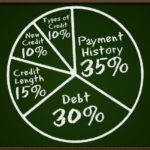Your credit score is calculated using different factors in your credit report, and is used as a prediction of how likely you are to pay back a loan.
When deciding whether to grant a loan, a creditor will consider if a borrower can make his or her outstanding minimum loans payments. If too much money is going towards existing obligations, a creditor may decline a loan.
A high score means you’re very likely to repay a loan while a low score indicates that you’re likely to default. Lenders are obviously more likely to give a loan to someone who poses less of a risk. Overall, a credit score measures the amount of potential risk the consumer is to the creditor.
Typically your credit score is a number from 0 to 999 and is calculated by using all the details on your credit profile. Each bureau has their own way of calculating a credit score, but all rely on one thing: a credit record.
This accounts different forms of information, including information their organisation already holds on you, or your employment circumstances. They consider how you pay your bills, how much debt you have and more importantly, how all of that compares to other credit active consumers.
If you’ve no credit record, you won’t have a credit score. While this may seem like a good thing, it isn’t. Without a means of determining your risk level, lenders won’t give you a loan. You have to have a credit score to qualify for credit, and that means taking on small loans that are easy to qualify for. If you’re responsible about paying these back, you can establish a good credit score.











